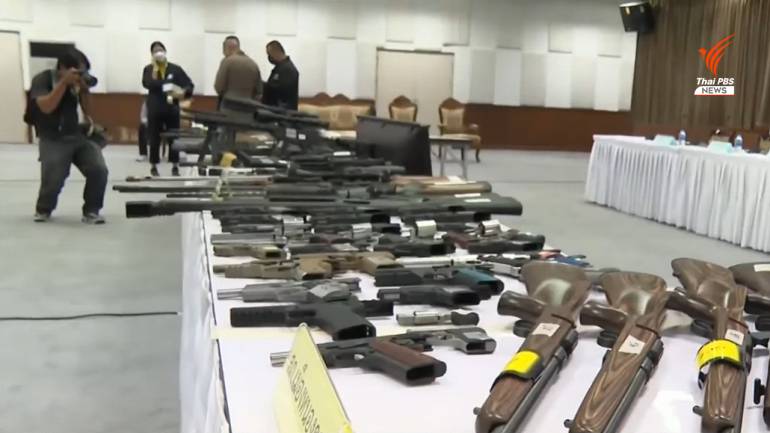The Royal Thai Police (RTP) are in the process of revising the entire management of service pistols and the welfare gun program, under which police officers can buy their own guns at lower than market prices, says Pol Gen Torsak Sukvimol, the deputy national police chief.
During an exclusive interview with Thai PBS he also said that the RTP will coordinate with the Ministry of Interior over tighter controls on the issuance of gun purchase permits, known as the Por 3 document, and licenses to own guns, known as the Por 4 document.
The current efforts to streamline gun controls in Thailand follow the mass shooting and knife attacks at a child care centre in the north-eastern province of Nong Bua Lamphu on October 6th, committed by a former, now deceased police officer, in which 36 people died, mostly young children.
There was also the theft of more than 150 service weapons, including several assault rifles, from a police station in Nonthaburi province, allegedly by a police officer, as well as widespread corruption in the gun welfare program.

The welfare gun program, managed by the Interior Ministry, enables personnel of state agencies and state enterprises, such as the RTP, the Customs, Revenue and Excise departments, to buy guns, mostly handguns, for their protection and that of their property. The Interior Ministry then contacts gun dealers in Bangkok who import weapons on its behalf. The guns are then distributed to agencies which placed orders with the ministry. The loophole in this program is that there is no limit on the number of weapons that an official can buy.
Pol Gen Torsak said that he will discuss with the Interior Ministry whether the program should be ended and other options, such as retaining the program but extending the period that guns bought under the program must be kept to 10-15 years, instead of five years, before they can be transferred, to prevent resale of the weapons.
Most police offers prefer to buy their own guns because of the heavy fines they have to pay if service pistols are lost or damaged.
The deputy national police chief said that the RTP may apply the US Army gun management system, but this will require amendment of regulations, to convince police officers to opt for service pistols instead of buying their own and a reduction in the fines when a service pistol is lost or damaged.
He admitted that there is corruption in the issuance of Por 3 permits, citing the example of one district registration officer who issued more than 600 permits to one individual. That officer was arrested in June this year for allegedly selling hundreds of guns to rebel groups in Myanmar.




